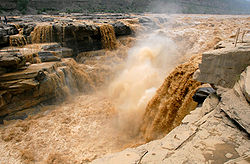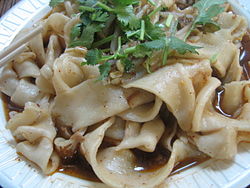Shaanxi (陕西; Shǎnxī), pronounced roughly Shahn-see, is a north-central province of China, and includes portions of the Loess Plateau on the middle reaches of the Yellow River as well as the Qinling Mountains across the southern part of the province.
Cities
[edit]- 1 Xi'an - Capital city of Shaanxi Province, starting point of the ancient Silk Road, known for its army of terracotta warriors.
- 2 Yan'an - center of Chinese revolution in 1937, nicknamed the "Cradle of the Revolution"
- 3 Yulin - garrison town on the Great Wall of China in the time of the Ming dynasty
- 4 Shenmu - garrison town on the Great Wall of China in the time of the Ming dynasty
- 5 Hanzhong - In historically, Hanzhong for a time became a place where armies fought, such as Liu Bang, Zhu Geliang etc
- 6 Baoji - The origin of the Zhou-Qin Dynasty, "the town of Chinese bronzes"
- 7 Tongchuan
- 8 Xianyang
- 9 Ankang
- 10 Shangluo
- 11 Weinan
- 12 Hancheng
Other destinations
[edit]
- Huangdiling National Park (Mausoleum of Yellow Emperor)
- 1 Huanghe Hukou Pubu National Park (Hukou Falls at Yellow River)
- 2 Huashan National Park
- Lishan National Park in Lintong
- Qiachuan National Park in Heyang (Qiachuan: Locally pronounced Hechuan)
- Tiantaishan National Park in Baoji
Understand
[edit]Shaanxi is a land-locked province in the middle reaches of the Yellow River. During a span of 1,100 years, 13 dynasties had their capital cities in Shaanxi, with a total of 73 emperors ruling supreme there. The land of Shaanxi is dotted with 60 paleoanthropologic, Paleolithic and Neolithic sites, 72 large-scale tombs of emperors, 20 or so imperial palaces, 2,604 ancient buildings, and 1,200 old temples and monasteries. Overall, you could say that Shaanxi Province is a colossal natural and historical museum for the world to visit.
Get in
[edit]Xi'an Xianyang International Airport (XIY IATA)
Get around
[edit]See
[edit]Do
[edit]Eat
[edit]

Shaanxi has its own cuisine which is rather different than the more commonly experienced Cantonese, Beijing, Shanghai or Sichuan cuisines. Shaanxi cuisine is particularly noted for its noodles, which come in many shapes and sizes and come accompanied with many different types of sauce. One is noteworthy for its name: biangbiang noodles (![]()
![]() 面, biángbiáng miàn), very wide, thick, chewy noodles in a sauce and topped with lots of hot chili peppers, have a name that can't even be written on most computers! The character for biáng — which refers to the sound made when stretching the noodles by pulling them and slapping them on the table — is arguably the most complex Chinese characters that's in frequent use. It was only added to the Unicode standard computer character set in 2020.
面, biángbiáng miàn), very wide, thick, chewy noodles in a sauce and topped with lots of hot chili peppers, have a name that can't even be written on most computers! The character for biáng — which refers to the sound made when stretching the noodles by pulling them and slapping them on the table — is arguably the most complex Chinese characters that's in frequent use. It was only added to the Unicode standard computer character set in 2020.
Drink
[edit]Sleep
[edit]Stay safe
[edit]Go next
[edit]

